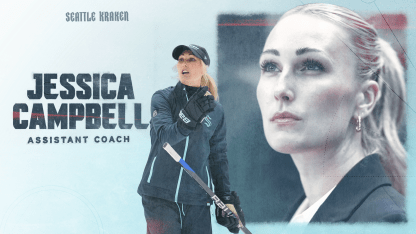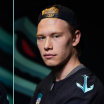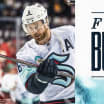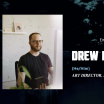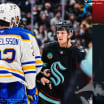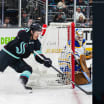Making the Jump
Many an athlete envisions a post-playing career into coaching, but not every one of them can accomplish it. Campbell loved hockey and teaching skating, but she learned that wasn’t enough. As she started her own business, JC Powerskating, Campbell dove into the behind the scenes work required to effectively coach; she honed her coaching voice; she keyed in on her “fire” to make a difference.
Slowly her patronage grew. She started with youth players and slowly began to work with all ages (her clients have included this year’s PWHL MVP, Natalie Spooner). And when the COVID-19 pandemic postponed the NHL season, as players prepared to return to play and get into game shape, it was Campbell who became a go-to resource.
Starting your own business, working with elite athletes doing what you love? Exhilarating – yes; intimidating – also yes. That didn’t stop Campbell. She recalls her initial session working with NHLer Mat Barzal. Campbell was preparing to teach cutbacks and jab steps – arguably the calling card of the Islanders’ center’s game. The coach drew up a plan “ten different ways,” but when she stepped on the ice, a specific motivation took over. She says she ripped up all the plans, stepped on the ice, and focused on creating as best a session as she could and bringing as much energy as she could. It was the beginning of a lasting relationship built on respect.
“Any moment where you're terrified usually means it matters to you,” Campbell said. “We obviously put pressure on ourselves around the things we care about most. So that's usually a good instinct and feeling for me is if this scaring me, (it means) I should probably do it and show up for it and lean into it.”
Lean in she did. The groups of skaters continued to grow, and Campbell solidified that she wanted to be a coach.
“I felt like what I was teaching and what I was working with (players) on was translating, and it was hitting in a different way,” Campbell said. “It definitely inspired me to think about the potential that, though I was never fixed on when and how (coaching) could be a potential goal of mine, and I'm going to chase that regardless of what that could look like.”
Campbell’s ability captured more and more attention. She worked as a skills coach for the Nurnberg Ice Tigers (Deutsche Eishockey Liga, Germany) and was behind the bench for Team Germany in the 2022 Men’s World Championship. And when Dan Bylsma was named head coach of the newest AHL franchise in Coachella Valley, he brought Campbell onto his staff – making her the first woman to serve as an assistant coach in the AHL.
“I knew what I wanted to do as a coach, but I didn't know what was next as a coach and where that would fit and how those opportunities might come,” Campbell said. “Dan saw the potential in me and brought me into his staff … he gave me a voice and empowered me to be nothing but myself.”
A Human Connection
For Campbell, one of her differentiators is her commitment to her craft. She’ll sometimes sit “for hours” with Bylsma in pursuit of more knowledge about coaching and the game. But in addition to understanding X’s and O’s, Campbell focuses on authentically getting to know the human who is being asked to perform them – it’s a critical element of how she’s been able to connect with athletes at the highest levels of hockey and compel them to want to work to be better even when they are already often considered elite.
“I'm a big believer in communication and showing compassion for the players of where they're at and, especially when it gets hard,” Campbell said.” The process has to be a human process…getting to know (players) as a person and building that trust. I think that is a strength of mine. I think there's strength in being vulnerable with players and creating a space where they can talk about their greatest challenges, whether that's on the ice, off the ice, but more so just showing them ‘hey, if you want to achieve this, let's create a plan. Let's put the pieces together, and let's get to work, and I'm going to stand by you and help you to stay accountable to that plan.’
“I just want to make sure that (players) know from the get-go that they're going to have the best success if they know that I believe in them. And really, if you don't have players that know you believe in them, then what are you working towards? That's where it starts for me.”
There’s also the importance of making the work fun and maybe even cool. Campbell is a believer in the saying “games are won in practice” and she credits the culture the staff in Coachella Valley created as a building block in two runs to the Calder Cup Final in the team’s first two seasons of existence. Her next task is to help bring that process to Seattle.
“The process is about (players) being challenged every day,” Campbell said. “The balance of development is it's got to be fun to show up and do the hard work because we know that ultimately the team could have success as a result. The coaches (have to) bring as much passion and energy and enthusiasm to the same job that we're asking of the players. I'm excited to be part of that.
“(Joining the Kraken) I’m excited to start to get to know everyone's story and each player and uniquely unpack where they're at in their career and how we, as a staff, how I personally, can help them raise their game and raise the standards and help hold them accountable to be the player that they want to be.”
The Impact
Campbell knows she is the first woman to be in her new role – she calls it “humbling.” But for her, that moniker of “first” only deepens the meaning of what she’s always been about: the work and the impact she can make with players. She’s quick to point out that she is not solely growing women’s presence in hockey, especially within the Seattle Kraken.
“I honestly don't feel like I'm the only (woman) in this organization,” Campbell said. “And that's a very special feeling - to be part of the Seattle Kraken organization and the staff and to stand by all the other remarkable women in this league that are maybe not behind the benches, but there's a long list of incredible women that are doing phenomenal jobs here in management, scouting, player development and so I'm just excited to do my part now behind the bench.”
Campbell knows that if the Kraken have success and her impact is positive, that can “open doors and open eyes” for different ways of thinking about what hockey can look like. That doesn’t lessen the focus on her top priority: the work. It’s what she’s always been driven by, now the meaning behind it is only deeper because of the opportunity she’s been given – to be the first, but not the only.
“I think what's special, and I'm excited about here in Seattle, is whether it's a young girl or a young boy's first NHL game, they're never going to see anything different than what they could possibly become,” Campbell said. “I'm happy to be able to play that role. And (be that) picture for the young kids.”

